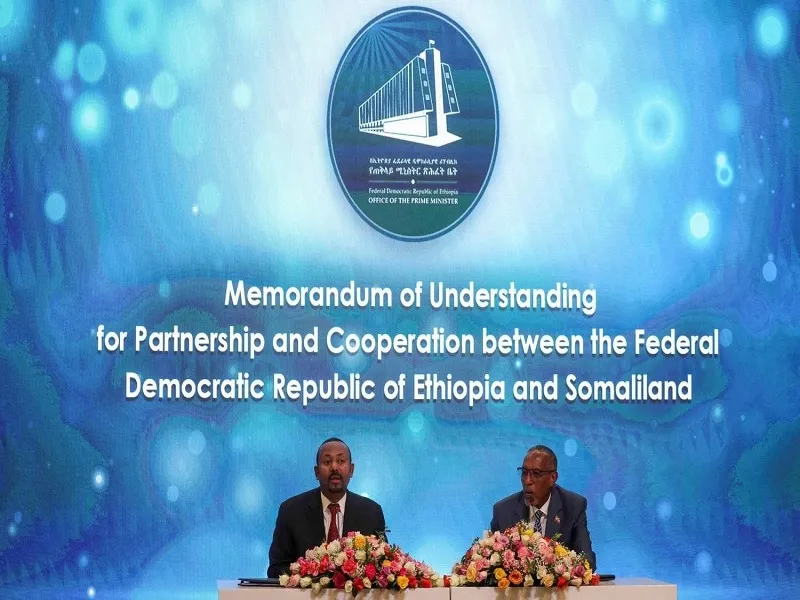The optics of multi-ethnic and religiously diverse Ethiopia cutting mutually beneficial deals with Somali Muslim Somaliland discredit the false notion that such cooperation is only possible in the region with one’s own identity groups. Moreover, they also undermine the basis upon which the regional security dilemma has been formed, namely the smaller coastal states’ fear that much larger hinterland Ethiopia is allegedly an aspiring hegemon that must be contained at all costs.
The Memorandum of Understanding (MoU) between Ethiopia and Somaliland whereby the first will recognize the second’s independence and give it stakes in national companies for commercial-military port rights has provoked all manner of regional ultra-nationalists. Those who adhere to such toxic ideologies place their perceived identity-centric interests above all else and literally hate the positive example set by these two countries working together to achieve common goals for mutual benefit.
The optics of multi-ethnic and religiously diverse Ethiopia cutting mutually beneficial deals with Somali Muslim Somaliland discredit the false notion that such cooperation is only possible in the region with one’s own identity groups. Moreover, they also undermine the basis upon which the regional security dilemma has been formed, namely the smaller coastal states’ fear that much larger hinterland Ethiopia is allegedly an aspiring hegemon that must be contained at all costs.
Instead of succumbing to these ideological (ultra-nationalist) and structural (security dilemma) pressures and therefore eschewing any serious deals with Ethiopia on those grounds, Somaliland stood firm in pursuit of its legitimate national interests. This served to discredit the aforesaid factors’ role in shaping regional policy and thus helped pioneer a new future for the Horn by enabling the creation of a new geo-economic corridor on the exact same day that Ethiopia joined BRICS.
The substance and symbolism of their perfectly timed MoU thus extends credence to descriptions of it as a diplomatic masterstroke that’s poised to be a game-changer in more ways than one. Not only did it discredit ultra-nationalist ideologies by showing that mutually beneficial cooperation between diverse countries is possible, but it also showed that the pursuit of shared interests through reciprocity can overcome the regional security dilemma. These outcomes will accelerate regional multipolar processes.
About them, one of the trends of the global systemic transition is the rapid movement towards geo-econmically driven regional integration, but the Horn has thus far been far behind most other parts of the world due to the previously identified ideological and structural obstacles. Now that the prior perception of them as insurmountable has been shattered, a new future is finally possible to coincide with Ethiopia’s membership in BRICS, but it can still be partially held back by the regional old guard.
For as convincing as his multipolar rhetoric may be, Eritrean President Isaias Afwerki (PIA) has regrettably obstructed regional multipolar processes this past year by declining Ethiopia’s proposal to swap stakes in a national company for commercial-military port rights. Even worse, Eritrean intelligence then fearmongered about this proposal by encouraging their assets to misportray it as allegedly implying annexationist intentions, which unprecedentedly exacerbated the regional security dilemma.
When last week’s MoU was agreed to between Ethiopia and Somaliland, this disinformation narrative was exploited by Al-Shabaab (AS) and the Federal Government of Somalia (FGS) to claim that their arrangement amounted to annexation, which set the grounds upon which those two’s unholy alliance is taking shape. The preceding hyperlinked analyses explain this in detail, but the takeaway is that the first could become the second’s and its partners’ like Eritrea’s proxy for waging hybrid war on Ethiopia.
Eritrea’s obstructionism of Ethiopia’s peaceful port plans is due to its leader being unable to fully liberate himself from the regional security dilemma after decades of this paradigm influencing the way in which he formulates policy. To his credit, PIA reciprocated Prime Minister (PM) Dr. Abiy Ahmed’s outreaches in 2018 to put their countries’ long-running problems behind them, but then he fell back into his old way of thinking after November 2022’s peace deal between the Ethiopian federal government and the TPLF.
Eritrea’s regional divide-and-rule information warfare operations, most of which are carried out via social media (others include allied “academics”, etc.), ramped up in response and continue growing in intensity to this day as they endlessly churn out lies fearmongering about Ethiopia’s intentions. At present, they serve to justify the ideological and structural foundations upon which the unholy alliance between AS and the FGS is being formed, which could become the catalyst for uncontrollable regional instability.
The Ethiopian-Somaliland MoU therefore represents a challenge from regional new guard leaders PM Abiy and President Muse Bihi Abdi to regional old guard head honcho PIA’s aforesaid paradigms. The latter leader himself overcame them for a brief moment before once again formulating regional policy under those influences. For the greater multipolar good that he claims to support, hopefully PIA will have another change of heart and Eritrea will stop fueling regional fires once and for all.

